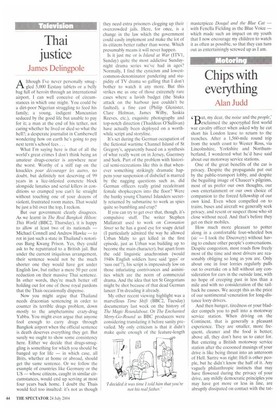Thai justice
James Delingpole
lthough I've never personally smug gled 5,000 Ecstasy tablets or a belly bag full of heroin through an international airport, I can well conceive of circumstances in which one might. You could be a dirt-poor Nigerian struggling to feed his family; a young, indigent Mancunian seduced by the good life but unable to pay for it; a man at the end of his tether, not caring whether he lived or died so what the hell?; a desperate journalist in Camberwell wondering how on earth he's going to pay next term's school fees ...
What I'm saying here is that of all the world's great crimes I don't think being an amateur drugs-courier is anywhere near the worst. Worthy of a stiff rap on the knuckles pour decourager les autres, no doubt, but definitely not deserving of 99 years in a lice-infested concrete block alongside lunatics and serial killers in conditions so cramped you can't lie straight without touching one of your dozens of violent, frustrated room mates. That would be just a bit over the top, I reckon.
But our government clearly disagrees. As we learnt in The Real Bangkok Hilton: This World (BBC2, Thursday), it is happy to allow at least two of its nationals — Michael Connell and Andrew Hawke — to rot in just such a state in Thailand's notorious Bang Kwang Prison. Yes, they could ask to be repatriated to a British jail. But under the current iniquitous arrangement, their sentence would not be the much shorter one they would have got under English law, but rather a mere 50 per cent reduction on their massive Thai sentence. In other words, they're much better off holding out for one of those royal pardons that the Thais occasionally dispense.
Now you might argue that Thailand needs draconian sentencing in order to counter its terrible drugs problem, down mostly to the amphetamine crazy-drug Yabba. You might even argue that anyone fool enough to carry drugs through Bangkok airport when the official sentence is death deserves everything they get. But surely we ought to show some consistency here. Either we decide that drugs-smuggling is something for which you should be banged up for life — in which case, all Brits, whether at home or abroad, should get the same sentence. Or we follow the example of countries like Germany or the US — whose citizens, caught in similar circumstances, would end up serving at most four years back home. I doubt the Thais would feel too insulted: it's not as though they need extra prisoners clogging up their overcrowded jails. Here, for once, is a change in the law which the government could easily implement and make the lot of its citizens better rather than worse. Which presumably means it will never happen.
Is it just me or is Island at War (ITV1, Sunday) quite the most addictive Sundaynight drama series we've had in ages? Normally, I find the cynicism and lowestcommon-denominator pandering and stupidity of TV drama so galling that I don't bother to watch it any more. But this strikes me as one of those extremely rare cases where a lavish budget (the Stuka attack on the harbour just couldn't be faulted), a fine cast (Philip Glenister, Clare Holman, James Wilby, Saskia Reeves, etc.), exquisite photography and top-notch direction (Thaddeus O'Sullivan) have actually been deployed on a worthwhile script and storyline.
It's set during the German occupation of the fictional wartime Channel Island of St Gregory's, apparently based on a synthesis of what really went on in Jersey, Guernsey and Sark. Part of the problem with historical semi-recreations like this is that whenever something strikingly dramatic happens your suspension of disbelief is marred by the nagging questions such as, did German officers really grind recalcitrant female shopkeepers into the floor? Were the hunky young Channel Islanders secretly returned by submarine to work as spies quite so bumbling and crap?
If you can try to get over that, though, it's compulsive stuff. The writer Stephen Mallatratt used to work on Coronation Street so he has a good eye for soapy detail (I particularly admired the way he allowed Urban Mahy to get killed in the first episode, just as Urban was building up to become the main character), but apart from the odd linguistic anachronism (would 1940s English soldiers have said 'guys' or 'suss out'?), his script is impressively low on those infuriating contrivances and asininities which are the norm of commercial drama. Arid the idea that ten St Gregorians might be shot because of that dead German lancer: I'm dreading it already.
My other recent viewing highlight was a marvellous Time Shift (BBC2, Tuesday) documentary last week on the history of The Magic Roundabout. Or The Enchanted Meny-Go-Round as BBC producers were considering translating it before sanity prevailed. My only criticism is that it didn't make quite enough of the feature-length masterpiece Dougal and the Blue Cat — with Fenella Fielding as the Blue Voice — which made such an impact on my youth that I now encourage my children to watch it as often as possible, so that they can turn out as entertainingly screwed up as I am.


























































 Previous page
Previous page